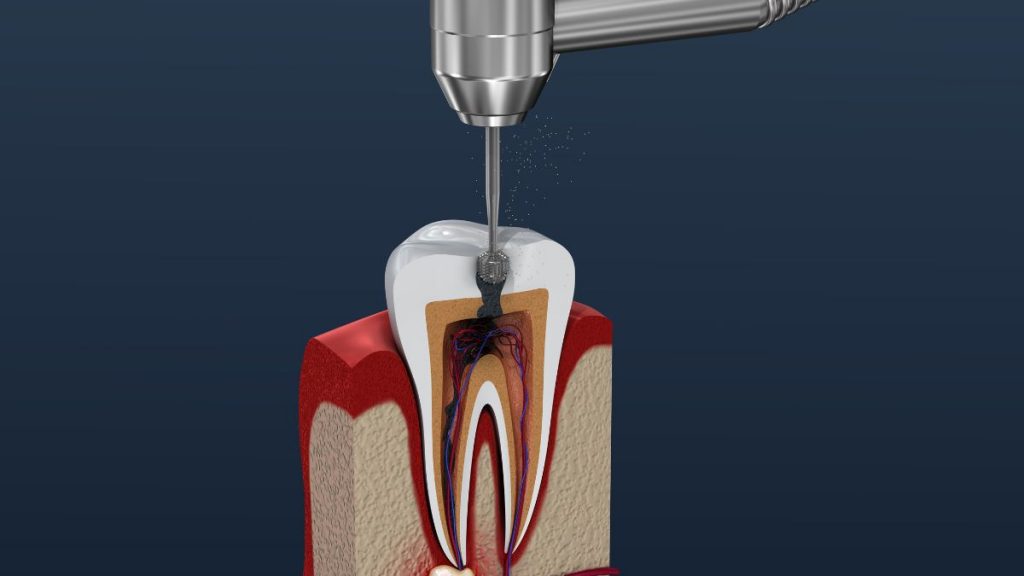Root canal treatment is a type of endodontic therapy used to save a tooth that has been infected or damaged. The procedure involves removing the damaged or infected tissue from inside the tooth and then filling and sealing the tooth.
Root canal treatment is often necessary when the pulp inside the tooth becomes inflamed or infected. This can happen as a result of tooth decay, a cracked tooth, or an injury to the tooth. If left untreated, the infection can spread to the bone surrounding the tooth and can eventually lead to tooth loss.
This treatment is usually performed by a dentist or an endodontist (a specialist in treating diseases of the teeth and their supporting structures). The procedure can be performed in one or more visits, depending on the severity of the infection.
During the procedure, the dentist will first remove the damaged or infected pulp from inside the tooth. The tooth will then be cleaned and sealed. A temporary filling will be placed in the tooth to protect it until the permanent restoration can be placed.
This treatment is a successful procedure in most cases. However, there is a small risk that the infection could return. In some cases, a tooth that has undergone root canal treatment may need to be removed.
What is root canal treatment?
Root canal treatment is a type of dental procedure used to treat infections in the tooth. The procedure involves removing the infected tissue from the tooth and then filling the tooth with a material to prevent further infection.
It is typically used when a tooth is severely infected or damaged and cannot be treated with a simple filling. The procedure can be used to save a tooth that would otherwise need to be extracted.
What do I need to know before a root canal?
Before a root canal, the patient will be given a local anesthetic to numb the area around the tooth. The dentist will then access the tooth by drilling a small hole through the tooth enamel. Once the tooth is accessed, the dentist will remove the damaged pulp tissue and clean the inside of the tooth. The tooth will then be sealed and a filling will be placed.
How long does it take to recover from a root canal?
A root canal usually takes one or two visits to the dentist. The first visit is to clean out the infected tooth and the second visit is to fill the tooth. Most people report that their teeth feel better after the first visit.
What are the 3 stages of root canal treatment?
There are three main stages of root canal treatment:
1. Cleaning and shaping the canal
The first stage of root canal treatment is the cleaning and shaping of the canal. This involves removing the infected or damaged tissue from the canal and preparing the canal for filling.
2. Filling the canal
The second stage of the treatment is filling the canal. This involves sealing the canal to prevent further infection.
3. Protecting the tooth
The third stage is protecting the tooth. This involves placing a crown or other restoration on the tooth to protect it from further damage.
What can you not do after a root canal?
This treatment is a common dental procedure used to save a tooth that has been severely damaged or infected. After the procedure is complete, it is important to take care of your tooth to ensure a successful outcome. Here are a few things you should avoid doing after root canal treatment:
- Eating hard or crunchy foods: Avoid eating hard or crunchy foods for the first few days after your procedure. This will help prevent any discomfort and allow your tooth to heal properly.
- Chewing on gum: Chewing gum can put unnecessary pressure on your tooth, which can lead to pain or discomfort.
- Drinking from a straw: Drinking from a straw can also put unnecessary pressure on your tooth.
- Brushing too hard: Be gentle when brushing your teeth for the first few days after root canal treatment. brushing too hard can cause pain or discomfort.
- Flossing too hard: Flossing is an important part of oral care, but be gentle when flossing your teeth after root canal treatment. Flossing too hard can cause pain or discomfort.
By following these simple tips, you can help ensure a successful outcome from your root canal treatment.
To learn more about root canal treatment and ask your questions, give us a call at 248-650-2440 or visit our dental clinic.
Please visit our Linkedin page for more information.


0 comments on “Root Canal Treatment”